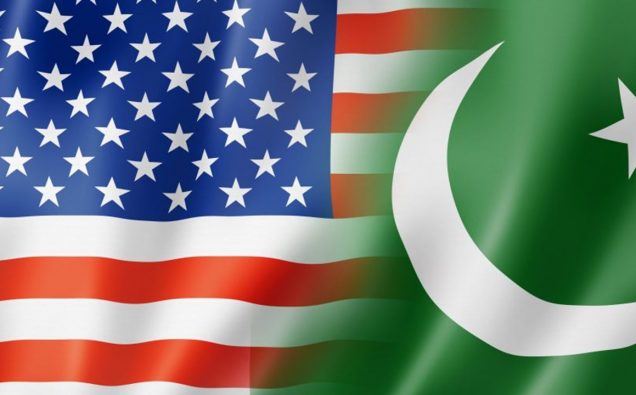
Just when it appeared that the United States and Pakistan were working earnestly toward Afghan reconciliation as a means to bringing America’s longest war to an end, President Donald Trump made blistering new allegations against Islamabad.
The latest tirade came during Trump’s interview with Fox News channel. While defending his administration’s decision to suspend assistance for Pakistan, Trump said Pakistan does not do “a damn thing for us.”
More strikingly, Trump implied that the country knew that al-Qaeda chief Osama bin Laden was living comfortably in a large nice house in Abbottabad before U.S. Special Forces took out the terror leader in a May 1, 2011 raid.
The allegations coincide with U.S. Special Representative Zalmay Khalilzad’s reported meeting with the Afghan Taliban as part of a new push to start peace and reconciliation process. The Taliban have been fighting the U.S.-supported Afghan government with the result that Afghanistan remains lost in a quagmire despite American investment in its economic and military development.
Here are the statements President Trump made on Pakistan during the interview:
“You know, living – think of this – living in Pakistan, beautifully in Pakistan in what I guess they considered a nice mansion, I don’t know, I’ve seen nicer.”
“But living in Pakistan right next to the military academy, everybody in Pakistan knew he was there.”
“And we give Pakistan $1.3 billion a year . … [bin Laden] lived in Pakistan, we’re supporting Pakistan, we’re giving them $1.3 billion a year — which we don’t give them anymore, by the way. I ended it because they don’t do anything for us, they don’t do a damn thing for us.”
On Monday, Pakistan responded by reminding the U.S. president of the country’s counterterror efforts, sacrifices and the economic losses it bore in the 9/11-triggered fight against terror that spilled over from Afghanistan into Pakistani tribal areas.
This is not the first time, the president has criticized Pakistan – which both the George W Bush and Barack Obama administration considered as key ally in the fight against al-Qaeda since 9/11 terrorist attacks. Trump had issued a stern condemnation of the South Asian country in a New Year tweet, accusing Pakistan of harboring Afghan militants.
But that accusation sounded more or less a reiteration of the U.S. position that Afghan Taliban had support on the Pakistani soil.
The latest allegations, however, mark a break with the past U.S. reports that recognized Pakistani counterterrorism efforts over several years.
Immediately after the May 1, 2011 raid on bin Laden compound in Abbottabad, the Obama White House had said Pakistani leaders did not know that the al-Qaeda leader was hiding in Abbottabad.
Besides, it seems paradoxical for the two countries to have their relations strained for months as their interdependence demands a close two-way cooperation. The U.S. needs Pakistan to get the job done in Afghanistan after spending trillions of dollars and dedicating military lives.
On the other hand, Pakistan relies on Washington’s goodwill for its economic progress. For example, it must have the U.S. nod to get a stopgap fiscal arrangement with the International Monetary Fund, where America is one of the biggest contributors.
So, what does this spat mean for the high-stakes U.S.-Pakistan relationship– still considered key to a peaceful outcome of the Afghan war?
Analysts say it is inconceivable that the U.S. president should issue these statements as representing some kind of a strategy.
“The time of these statements could not have been worse, and this is not something strategic,” Dr. Marvin Weinbaum, Director Afghanistan and Pakistan Studies at the Middle East Institute, says.
He told Views and News on Monday that there couldn’t be any settlement of any value in Afghanistan without Pakistan being on board.
And Afghanistan is not the only reason for U.S. having long-term relations with Pakistan in a region, where China and Russia are flexing muscles to expand their influence, and where South Asian peace between nuclear-armed India and Pakistan demands an influential U.S. engagement.
“The U.S. engagement with Pakistan goes beyond Afghanistan, it’s about war and peace on the subcontinent, it’s about nuclear non-proliferation, and on all these issues, the U.S. has to find a way to work with Pakistan.”
“Alienating Pakistan is not a good idea,” Dr. Weinbaum said, pointing to a scenario, where the South Asian country chooses to go against U.S. interests.
In the immediate context, such public criticism of the ally could hurt efforts toward Afghan reconciliation. Only last week, Pakistan released two Afghan Taliban leaders as a sign of its support for a new Afghan peace initiative.
Secondly, Islamabad may increasingly rely on China for its development and defense needs – something that will further reduce U.S. influence in the region.
Thirdly, if the statements are aimed at pressuring Islamabad, history shows that that kind of approach does not work. Both the George W Bush and Barack Obama administrations had a pragmatic approach to relations with Pakistan, mixing criticism with assistance, thus retaining influence.
But if the U.S plays all its cards and leaves nothing to use as dynamic of influence, it does not serve American interests.
Fourthly, Pakistan is witnessing an unprecedented run of democracy with a representative government that came into power this year. Dealing with Pakistan’s democratic leaders will serve America the best as it would address longtime public concerns that Washington only deals with Pakistan’s military dictators. A cooperative relationship with a democratic government will also tamp down anti-Americanism.
Fifthly, it is the militant mindset and terror organizations like ISIS that will exploit prolonged anarchy in Afghanistan.
As of now, the U.S. cannot afford to set the clock back on Afghanistan because moving forward seems to be the only option. And without Pakistan’s help, a lasting progress toward Afghan stability looks an improbable scenario. The U.S. investments in blood and treasure and Pakistan’s civil and military sacrifices as well as economic losses demand both work to iron out their difference through diplomacy in the interest of international peace and development.














